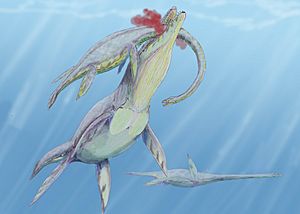Sauropterygians facts for kids
Quick facts for kids SauropterygiaTemporal range: Lower Triassic – Upper Cretaceous
|
|
|---|---|
 |
|
| The pliosaur Kronosaurus hunts a plesiosaur: by Dmitry Bogdanov. |
|
| Scientific classification | |
| Kingdom: | |
| Phylum: |
Chordata
|
| Class: | |
| Superorder: |
†Sauropterygia
Richard Owen, 1860
|
Sauropterygia were a group of amazing water reptiles that lived a very long time ago, during the Mesozoic era. This was the time of the dinosaurs! These reptiles were very good at swimming. They had special shoulders that helped them make strong strokes with their flippers, like paddles. Some of the later ones, like the pliosaurs, also had special hips to help them swim even better.
Contents
Origins and evolution of Sauropterygians
The very first sauropterygians appeared about 245 million years ago. This was at the beginning of the Triassic period. At first, they were quite small, less than a meter (about 3 feet) long.
These early sauropterygians were like lizards that spent some of their time in the water. They had long limbs and are known as pachypleurosaurs. Over time, they grew bigger and became a group called nothosaurs, which could be several meters long.
Different types of Sauropterygians
The sauropterygians also included a very unique group called the placodonts. These animals were "bottom-feeders." This means they ate food found at the bottom of the water, like shellfish. They had flat, strong teeth that were perfect for crushing the shells of their prey.
The big change
Most of these early sauropterygians disappeared during a huge event called the End–Triassic extinction event. This was a time when many types of animals died out. Only one group of sauropterygians survived: the plesiosaurs.
After this extinction event, during the early Jurassic period, plesiosaurs quickly grew into many different forms. Some became the long-necked, small-headed plesiosaurs we often imagine. Others became the short-necked, large-headed pliosaurs.
Orders of Sauropterygians
Here are some of the main groups (orders) of sauropterygians:
Sauropterygians with uncertain position
Some sauropterygians are harder to place into a specific group:
See also
 In Spanish: Sauropterigios para niños
In Spanish: Sauropterigios para niños
 | Sharif Bey |
 | Hale Woodruff |
 | Richmond Barthé |
 | Purvis Young |

